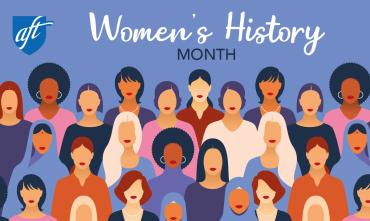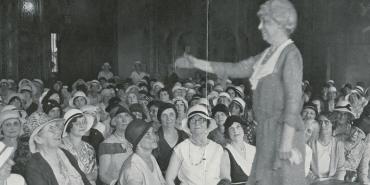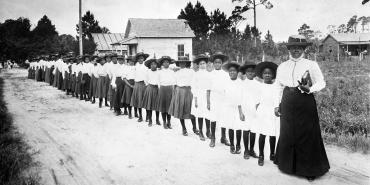This Women’s History Month, the AFT celebrates both historical and contemporary commitments to women’s rights, gender equity and lifting up the contributions women have made since time immemorial—contributions that have often gone unrecognized.
The AFT has always been deeply tied to women’s history. We represent individuals in two professions dominated by women—teaching and nursing. We are part of a labor movement where women have played pivotal roles as the majority of workers in places like the Triangle Shirtwaist Factory in New York, where a tragic fire killed 146 workers and sparked workplace safety reforms in 1911. The AFT was even founded by women, led by Margaret Haley, a Chicago teacher and dogged labor leader so fierce she was known as the “Lady Labor Slugger” in the early 1900s.
But the AFT does not stop at history: We carry the legacy forward. Two of our top three leaders are women—AFT President Randi Weingarten and Executive Vice President Evelyn DeJesus. Secretary-Treasurer Emeritus Lorretta Johnson, though now retired, left a lasting mark on the organization, as did the late former AFT President Sandra Feldman. And of course there is the first woman president of the AFL-CIO, Liz Shuler.
It is not just that these individuals identify as women—they lead our movement in essential ways, carving out a highly visible and influential place at the table of public discourse and helping create policy that is shaped by the needs of working families, including the unique experiences of working women who happen to be educators, healthcare workers and public employees.
As women in the movement, and with the men and nonbinary people who work beside us, we champion equity at every step of the way. In a world where women still earn just 82 cents for every dollar men earn—and where Latina and Black women make even less, at 58 cents and 63 cents, respectively, on the white man’s dollar—the fight is far from over.
Making history
Back in the late 19th century, nearly all grade-school teachers were women, and for many, working conditions were deplorable. In Chicago, where Margaret Haley taught 50 to 60 children per classroom in the stockyards district made famous by Upton Sinclair’s 1906 exposé The Jungle, grinding poverty among students and increasingly rundown schools inspired her to fight for improved living conditions for families as well as educators. At the time, teachers were paid less than unskilled workers and had no control over the curriculum, which was imposed by bureaucrats.
Meanwhile in New York, Henrietta Rodman, who taught in the early 1900s, swam against the tide trying to prepare girls for careers and fought the common practice of firing teachers when they married or had children. In 1916, the unions these two women belonged to joined forces with six others to form the American Federation of Teachers.
While the union did grow, low salaries and economic insecurity continued to plague the profession. By the 1930s, women were also faced with policies that dictated the lengths of their skirts, required that their galoshes be buckled and forbid them to see “gentleman callers” more than three times a week.
Despite these odds, women labor leaders before and after made their mark in the world. Former school teacher Mother Jones, once called “the most dangerous woman in America,” led children out of the mines and silk mills of Pennsylvania and marched all the way to the White House to protest child labor in 1903, insisting that these young people be allowed to attend school instead of working in exceedingly dangerous jobs for pitiable wages. (Notably, AFT President Randi Weingarten was also called “most dangerous,” but like so many other women, she did not back down either.)
Dolores Huerta fought fiercely for migrant workers’ rights, in the fields, at protests and at podiums, and is still active in labor and education spaces—including in the recent National Association for Bilingual Education conference that the AFT participated in.
In education, Mary McLeod Bethune impacted women’s rights through educating girls, first in the school she founded with $1.50 and a resourceful spirit that allowed the school to grow from five students to 250 and eventually become Bethune-Cookman College (now University). Bethune went on to found the National Council of Negro Women and was part of President Franklin Delano Roosevelt’s “Black Cabinet” of advisers, influencing the advancement of education for Black Americans as well as civil rights writ large.
Dorothy Height also helped steer the growing civil rights movement: She fought against lynching, pushed for voter registration and worked to address flaws in the criminal justice system. She was president of the NCNW for 40 years and counseled presidents Dwight Eisenhower and Lyndon Johnson as well as Eleanor Roosevelt. She also helped organize the 1963 March on Washington and took her place on stage with the men who dominated the movement.
Other inspiring women in labor and education include indefatigable and radical labor activist Lucy Parsons, who led the first May Day parade and was once called “more dangerous than a thousand rioters” for standing up to the sometimes violent resistance to the labor movement in Chicago in the 1800s. May Chen led Chinatown garment workers as they went on strike in the 1980s in New York City; former Labor Secretary Alexis Herman—the first Black woman to hold that position—helped grow job opportunities for young women and fought for the rights of women and people of color in the workplace; and the powerful hotel and culinary workers strike leader Hattie Canty was inspired by personal experience trying to raise 10 children by cleaning hotel rooms in Las Vegas.
Continuing the tradition
Today, the AFT continues to advocate for girls and women. When the Supreme Court struck down Roe v. Wade and threatened women’s rights to reproductive healthcare, the AFT not only issued a resolution condemning the decision and vowing to reverse it, its higher education affiliate, AFT Academics, set up a resource guide for members in states where care is most severely restricted.
At each of our biannual conventions, we recognize women who have gone above and beyond with our Women’s Rights Award, honoring people like Nancy Pelosi, Diane Ravitch, Hillary Clinton and Dolores Huerta. We are all in for the annual Women’s March, with leaders and members showing up at the mic and in the crowd to participate in person. We provide training for women who want to become leaders in their communities, and we support many who decide to run for elected positions.
We ally ourselves with women already holding office and help inform the policy they craft—policy that benefits women, girls and working families as well as public education, public services and accessible healthcare. Our affiliates champion union contracts that uphold gender equity and ensure fairness on the job for thousands of people working in positions traditionally dominated by women.
And we make sure that young people learn women’s history in school. Our Share My Lesson online resource has an entire collection of Women’s History Month lesson plans, including videos, handouts, activities and webinars that include everything from animated profiles of “unladylike” history makers to compelling studies on how Black girls are pushed out of school. There are lessons about women in aeronautics, Latina labor leaders, equity for women’s soccer and influential rock and roll stars, and there is a whole section on women’s suffrage and equal rights.
This effort to educate young people about the myriad contributions of women to every realm of our lives is crucial: According to National Women’s History Museum research, “Where Are the Women,” just 24 percent of the historical figures who are taught in classrooms are women, and that includes fictional characters like Rosie the Riveter.
We are so much bigger than that.
[Virginia Myers]




